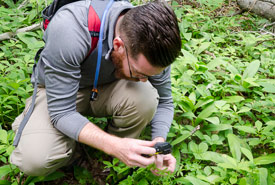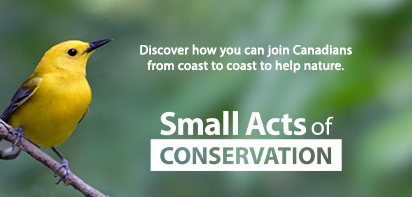Collaborate with NCC

Cataloguing biodiversity on NCC properties is an important aspect of monitoring ecosystem health and alterations. Here, Mitchell MacMillan takes a photo of a plant to ID and record during an assessment on Holman's Island, PEI (Photo by Sean Landsman).
The Nature Conservancy of Canada (NCC) engages in partnerships with researchers from academia, government and other non-governmental organizations. NCC can act as a primary collaborator on research grants, such as Mitacs or NSERC Alliance, as well as offer letters of support for projects that address our research priorities.
NCC supports researchers by providing access to our properties and conservation information. Our properties include some of the most diverse habitats in Canada and serve as excellent natural laboratories. We collect considerable data on each of our properties and can provide researchers with information on species, habitats and monitoring results from management actions.
NCC staff can also contribute their expertise and will collaborate on research projects, particularly if they relate to ongoing or planned management actions. Many of NCC's management actions can be applied in a replicated, experimental manner. Common management actions include controlled burning, invasive species control, grazing, haying and various ecological restoration activities.
In some locations, equipment may be available to loan to researchers. This can include boats, canoes, ATVs, trailers, field computers, water-level transducers, chainsaws, greenhouses and equipment storage facilities.
NCC also maintains facilities on many of our properties, which can be used to house researchers and field crews, often on a cost-recovery basis. Examples include:
- Ivey Research Station, 567 East Shore Road, Pelee Island, Ontario
- Shorebird Field Cabin, 2459 Route 935, Johnson’s Mills, New Brunswick (Johnson’s Mills Shorebird Reserve and Interpretive Centre)
- Old Man on His Back Prairie and Heritage Conservation Area, Saskatchewan
- The Weston Family Tall Grass Prairie Interpretive Centre, 32087 Road 10N, Stuartburn, Manitoba
- Pitman Research Cabin on NCC's Gravelly Bay property, Long Point, Ontario
Field houses are also potentially available in Quebec and in other locations in British Columbia and Ontario. Availability and conditions vary among facilities.
In addition, the Weston Family Conservation Science Fellowship Program encourages further collaboration with academic institutions and graduate students.
Please contact Aerin Jacob for more information on collaborating with NCC.




